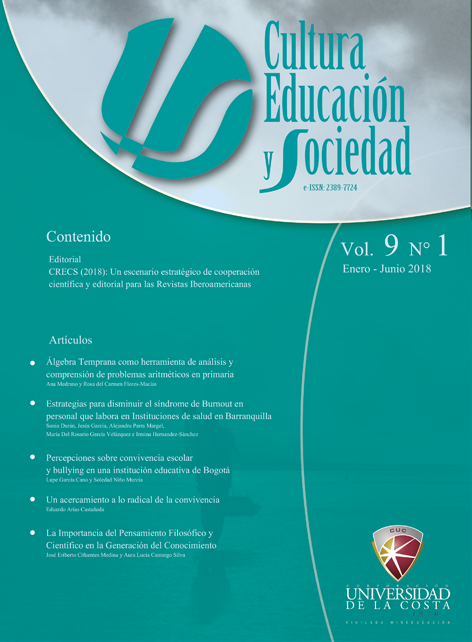Environmental education through research as a pedagogical strategy
DOI:
https://doi.org/10.17981/cultedusoc.9.1.2018.18Keywords:
Environmental education; research as a pedagogical strategy; productive projects, educational institutionAbstract
Environmental education is a theoretical-practical tool that allows the integration of social elements typical of the school context, creating a conscious citizenship. The study sought to promote environmental education through research as a pedagogical strategy, guided by the methodological guidelines of the IEP with a design based on the trajectories of inquiry, was attended by eighty (80) participants from the educational institution Tucurinca located in the Municipality of Magdalena Bananera Zone. The results showed different environmental problems observed by the students in the community through the process of investigation, where the wetland deterioration was found, as well as the proliferation of insects and fungi produced by decomposing garbage that affect the health of the population. students were organized in research groups and designed proposals to solve the different problems found, finally these proposals were disseminated and socialized in the institutional science fair.
Downloads
References
Castillo, G. (2011). Estudio de niveles de educación ambiental formal del parque Nacional Macahlilla y su zona de amortiguamiento.
Carrato, A., y Marval, R. (2007). Propuesta de un programa de educación ambiental para la conservación del agua y recolección de residuos sólidos, aplicable a las comunidades. Universidad del Oriente, Venezuela.
Cortés Peña, O. (2016). Sustainable development in synergistic relationship with proambiental behavior and fair trade. IJMSOR, vol. 1, no. 1, pp. 54-58
De Souza, J. (2001). Manual de estilo de la lengua española. Edições Bagaço.
Espejel, A., & Flores, A. (2012). Educación ambiental escolar y comunitaria en el nivel medio superior, Puebla-Tlaxcala, México. Revista mexicana de investigación educativa.
Herrera, K., & Bravo, E. (2013). Perspectiva de la ecología en la comprensión de los comportamientos ambientales. Omnia, 19 (3), 20-30.
Mariño, G. (2010). El diálogo en la educación de jóvenes y adultos. Dos propuestas pedagógicas para implementarlo. En: El taller dialógico / la recuperación de experiencias laborales. Bogotá. OEI.
Martínez, R. (2009). Importancia de la educación ambiental. En Revista Educare, Vol. XIV, # 1, UNA.
Martínez, R. (2007). Enfoque de la investigación cualitativa. Revista Tópicos #144, UNA.
Mejía, M & Manjarrés, M. (2010). La Investigación como Estrategia Pedagógica. Programa Ondas – Colciencias.
Mignolo, W. (2003). Capitalismo y geopolítica del conocimiento. Buenos Aires: Paidós
Navarro, R. y Garrido, S. (2006). Construyendo el significado del cuidado ambiental: un estudio de caso en educación secundaria, Reice. Revista electrónica iberoamericana sobre calidad eficacia y cambio en educación (España), vol. 4, núm. 1, pp. 52-70.
Novo, María. (2006). Educación ambiental. Desarrollo sostenible y globalización. Revista de Educación Ambiental, año 4 No 6, México.
Organización de las Naciones Unidas. (2012). Política Nacional de Educación Ambiental. Recuperado de https://rio20.un.org/sites/rio20.un.org/files/a-conf.216-l-1_spanish.pdf.pdf
Ortega, P., Peñuela, D & López, D. (2009). Sujetos y prácticas de la pedagogía crítica. Ediciones El Búho. Bogotá.
Perales, F., & Ayerbe, J. (2016). El trabajo por proyectos y por resolución de problemas en Educación Ambiental: análisis y tendencias.
Pozo, J. & Gómez, M. (2006). Aprender y enseñar ciencia. Ediciones Morata. 5ta. Edición. Madrid.
Sandoval, M. (2012). Comportamiento sustentable y educación ambiental: una visión desde las prácticas culturales. Revista Latinoamericana de Psicología, 44(1), 181-196.
Sauvé, L. (2014). Educación ambiental y ecociudadania. Dimensiones claves de un proyecto político-pedagógico-Environmental education and eco-citizenship. Key dimensions of a pedagogical-political project. Revista científica, 1(18), 12-23.
Torres, A. (2007). La educación popular. Trayectoria y actualidad. Bogotá: El Búho.
Downloads
Published
How to Cite
Issue
Section
License
Copyright (c) 2018 CULTURA EDUCACIÓN Y SOCIEDAD

This work is licensed under a Creative Commons Attribution-NonCommercial-NoDerivatives 4.0 International License.
![]()
Creative Commons 2020 CULTURA EDUCACIÓN Y SOCIEDAD
This article is under international license Creative Commons Reconocimiento-NoComercial-SinObrasDerivadas 4.0.
The published articles are the sole responsibility of their authors and do not necessarily reflect the opinions of the editorial committee.
CULTURA EDUCACIÓN Y SOCIEDAD respects the moral rights of its authors, who assign to the editorial committee the patrimonial rights of the published material. In turn, the authors inform that this work is unpublished and has not been previously published.
All articles are under a:
Licencia Creative Commons Atribución-NoComercial-SinDerivadas 4.0 Internacional.
![]()


 English
English
 Español (España)
Español (España)




_12.53_.27_p_. m_._3.png)





_12.57_.35_p_. m_._3.png)
_12.50_.37_p_. m_._3.png)



